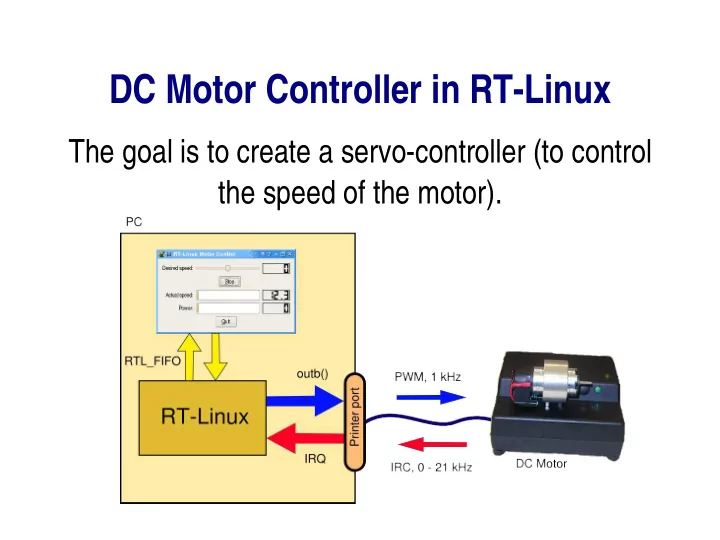

DC Motor Controller in RT-Linux The goal is to create a servo-controller (to control the speed of the motor).
Steps to Create a Controller 1. Create basic RT-Linux module. 2. Try to rev up the motor at full speed. 3. Write a thread for PWM generation (period 1 ms) 4. Write an IRQ handler (position measuring). 5. Write a thread for speed measuring. 6. Design a controller (PID) for the speed control. 7. Allow communication with user-space. 8. Write a user-space interface for the controller.
A Basic RT-Linux Module The same kind of module which Linux uses for drivers etc. The code runs in the kernel-space (shares all code and data with the Linux kernel). Source: simple.c #include <linux/module.h> #include <linux/kernel.h> Makefile for compilation int init_module (void) { printk("Init\n"); return 0; all: simple.o } include /usr/rtlinux/rtl.mk void cleanup_module (void) include $(RTL_DIR)/Rules.make { printk("Cleanup\n"); } Running the application: MODULE_LICENSE("GPL"); shell# insmod simple.o
Parallel Port PWM: bits 0, 1 Motor rotation: IRQ – left: outb(1, 0x378); IRC { – right: outb(2, 0x378); IRC signals: PWM (left, right) – inb(0x379); IRQ 0x378 0x379 IRC 0x37a
Periodic Threads start time #define MS (1000000) void * thread_func (void *arg) { pthread_make_periodic_np (pthread_self(), gethrtime(), 2*MS); while (1) { period /* do something */ pthread_wait_np (); } return NULL; } wait for the start of the next period int init_module(void) { pthread_t thr; pthread_create (&thr, NULL, &thread_func, NULL); return 0; }
Thread Priorities Rate Monotonic Priority Assignment – the lesser task period the higher assigned priority In RT-Linux: The higher number the higher priority int init_module(void) { pthread_attr_t attr; struct sched_param param; the priotity of the thread pthread_attr_init(&attr); param.sched_priority = 1; pthread_attr_setschedparam(&attr, ¶m); pthread_create(&thr, & attr , &thread_func, NULL); return 0; }
IRQ Handling Parallel port: IRQ 7 Interrupts reception should be reenabled in the handler! unsigned int irq_handler(unsigned int irq, struct pt_regs * regs) { /* do something */ rtl_hard_enable_irq (irq); return 0; } status = rtl_request_irq (irq_number, irq_handler);
Signals From an IRC sensor channel A channel B IRQ Whenever the value of any IRC sensor channel changes, electronics in the motor generates an IRQ. The motor contains IRC with 100 pulses per rotation and there are 4 IRQs per one pulse.
PID Controller e k y k + PID Desired value controller – Motor Speed Voltage (PWM duty cycle) k − 1 y k = P ⋅ e k I ⋅ ∑ e i D ⋅ e k − e k − 1 i = 0
Fixed Point Arithmetic We need to use decimal numbers in calculations For this simple task we don't need to use a mathematical coprocessor . Smaller processors don't have any coprocessor. Integer part (24 bit) Decimal part (8 bit) int (32 bit) 5.0 ~ 0x500, 2.5 ~ 0x280 Addition: 5.0 + 2.5 ~ 0x500 + 0x280 = 0x780 ~ 7.5 Multiplication: 5.0 * 2.5 ~ 0x500 >> 4 * 0x280 >> 4 = 0x50 * 0x28 = 0xC80 ~ 12.5
RT FIFOs Communication between RT-Linux and user-space. Unidirectional communication, for bidirectional communication we need two fifos. #include <rtl_fifo.h> RT-Linux side We use the FIFO number 0 int fifo = 0; rtf_create (fifo, 1000); rtf_create_handler(fifo, &read_handler); retval = rtf_put (fifo, &variable, sizeof(variable)); int read_handler(unsigned int fifo) { int reference; rtf_get (fifo, &reference, sizeof(reference)); return 1; }
RT FIFOs – User-Space Side From the user-space the FIFO looks like an ordinary file. int i, j; if ((fifo_out = open ("/dev/rtf0", O_WRONLY)) < 0) { perror("/dev/rtf0"); exit(1); } We use the FIFO number 0 write (fifo_out, &i, sizeof(i)); read (fifo_in, &j, sizeof(j));
Recommend
More recommend